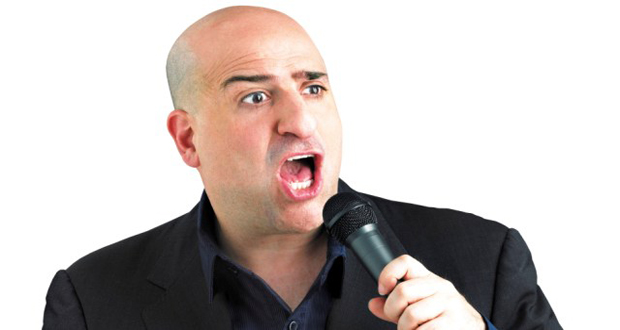Interview: Omid Djalili

Omid Djalili is currently touring his newest show Tour of Duty. The Iranian funny-man, who has appeared in film and television on both sides of the pond, will be coming to York (19th January), Bradford (2oth) and Manchester (21st) in the next few days. James Harle managed to catch up with him in a free moment on the road. As it turned out, Djalili’s tour so far hasn’t been as relaxing as he’d hoped…
JH: So, how was Christmas with the Djalilis? Did you have a happy holiday?
OD: I had a wonderful Christmas. Whenever you tour at this time, the theatres are booked up with pantos – and you can’t actually do a gig. It’s like being a student again: you get a couple of weeks off holiday, and I really needed it. People think touring is easy, but not the way I do it. I literally spent the whole Christmas season hanging out, seeing friends…oh, and doing paperwork. To my horror, I found I had twelve congestion charges – and a bunch of tickets for the tour bus. Something about flashing on the motorway…
JH: I’m shocked and appalled.
OD: I know, and I don’t even go in my tour bus a lot of the time. At the moment I’m following it, in my own car. Everyone in there’s playing video games, watching films, cracking jokes and eating snacks. Every so often I come alongside, and I mime at them: “I’m paying for that. I’m paying for that.” But they just close the curtains. Rudeness, rude behaviour…they don’t even come out when they stop for petrol. They just text to say: “Still watching Back To The Future!”
JH: It must be nice to have the support of your fans then, when your touring buddies have turned on you. Your audience must be a pretty diverse bunch, I would have thought…
OD: Well it’s amazing, because I have a friend who’s an Iranian actor, and very into the comedy scene – and he was amazed to find that my audiences only have a smattering of ethnic minorities. They’re mostly British; they’re the mainstream. I think it’s because I had a BBC1 show – that’s the mainstream. Alternative comedy might go to BBC3, or even BBC2, but to have a BBC1 show I never, ever expected. But hey, within that mainstream, there’re a lot of different people: different ages, different backgrounds. There’s no class divide at my show, I’ve noticed. At a signing afterwards, I’ve met aristocrats queuing behind salt-of-the-earth looking people. I couldn’t understand the aristocrats because they spoke so posh, and the others had such a broad cockney accent that I couldn’t understand them either.
JH: Best keep the accents onstage then, I suppose. But didn’t you say that you wanted this tour to be more cerebral, more sophisticated? How easy is it proving to put aside the impish little dances and Godzilla impressions?
OD: Good question, good question. I’ve always said, with comedy, a lot of people get into it almost accidentally. People like Billy Connolly, doing jokes in between his songs. And then, without knowing it, you gravitate towards comedy, towards making people laugh. But you don’t know what you’re doing, fundamentally, and it’s taken me seventeen years to work it out. To understand how and why I’m doing it; to understand the power, and respect it as an art form. I used to just go from one joke to the next, cobbling together whatever was funny – which is how most comedy shows are: a dash of this, a dash of that. But I’ve realised that the comedians I really like, like Eddie Izzard and George Carlin, create something coherent. That’s what I want to do: create something with a bit more meaning.
JH: And has it worked? Is it all coming together?
OD: Well, what’s actually happened is that as I’m going along, it’s all been disintegrating. I’m dancing and singing more, and I’ve stopped being so cerebral; I’ve become a mainstream middle-eastern crowd-pleaser. All my high hopes and aspirations have fallen at my feet. It’s a bit of fun though, and it’s all about balance – like when you do something political, it has to be undercut by impish absurdity. It’s all about balance. I don’t take myself too seriously, because I don’t want to be a clerk, and I don’t want to be a political comedian. Anyway, the point is: it’s not what I thought it was going to be, but it is something – and it does have coherence.
JH: You’ve obviously put a lot of thought into this; but if you had to sell the tour to Giggle Beats’ readers, what would you say was the show’s unique selling point?
OD: The USP is how slowly the tickets are selling. If you can buy at the right time, you could probably get a whole row to yourself. You could lounge out across five or six seats. I do recommend it.



































